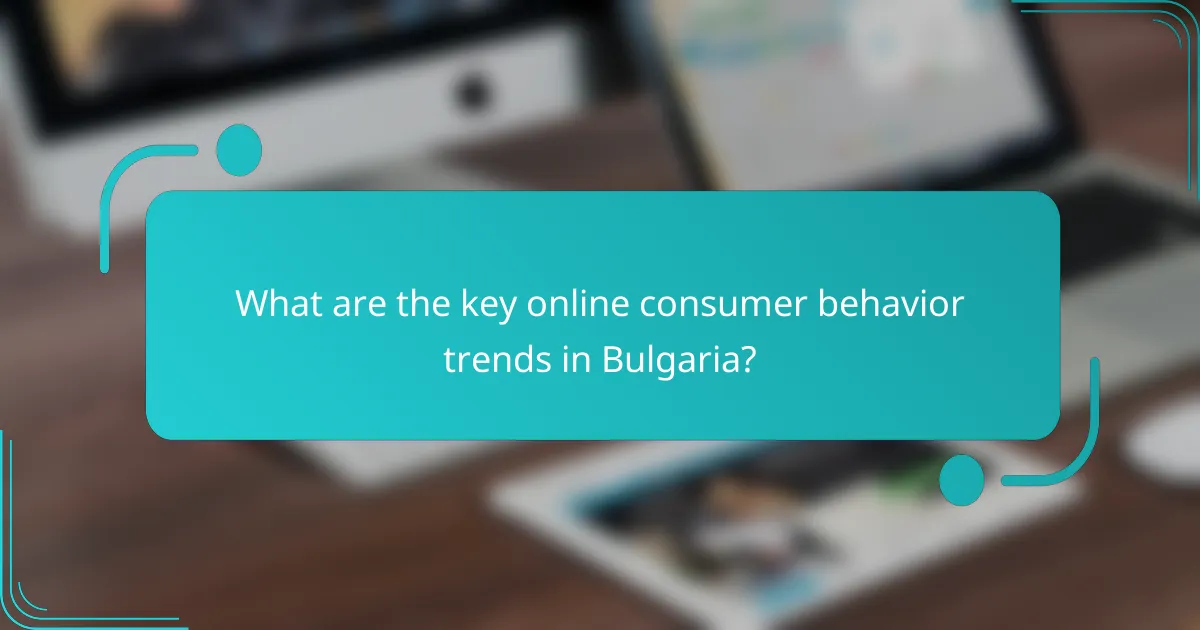Cultural influences play a pivotal role in shaping online consumer behavior trends in Bulgaria, where traditional values and local customs significantly impact purchasing decisions. As Bulgarians increasingly favor local brands and embrace mobile shopping, the interplay between culture and e-commerce becomes evident, highlighting the importance of tailored marketing strategies that resonate with the unique linguistic and cultural context of the region.

How do cultural factors influence online shopping in Bulgaria?
Cultural factors significantly shape online shopping behaviors in Bulgaria, affecting consumer preferences and purchasing decisions. Elements such as traditional values, family dynamics, and local customs play crucial roles in how Bulgarians engage with e-commerce platforms.
Impact of traditional values
Traditional values in Bulgaria, such as respect for heritage and community, influence online shopping by encouraging consumers to support local businesses. Many Bulgarians prefer to buy from domestic brands that reflect their cultural identity, which can enhance customer loyalty.
Additionally, the emphasis on quality and craftsmanship often leads consumers to research products thoroughly before making purchases. This means that online retailers must provide detailed information and showcase their products’ authenticity to appeal to these values.
Role of family and community
Family and community play a pivotal role in the online shopping habits of Bulgarians. Decisions are often made collectively, with family members discussing purchases and seeking input from one another. This communal approach can lead to a preference for products that are perceived as beneficial for the family unit.
Online retailers can leverage this by offering family-oriented promotions or bulk purchasing options, which cater to the collective decision-making process. Engaging with community feedback through reviews and social media can also enhance trust and influence buying behavior.
Influence of local customs
Local customs significantly affect online shopping trends in Bulgaria, particularly during holidays and special occasions. For instance, during traditional celebrations, consumers are more likely to shop for specific gifts or foods that align with cultural practices, impacting sales patterns for e-commerce businesses.
Retailers should consider local customs when planning marketing strategies, ensuring that promotions align with cultural events. Offering seasonal products or themed discounts can attract consumers looking to celebrate in a culturally relevant manner.

What are the key online consumer behavior trends in Bulgaria?
Key online consumer behavior trends in Bulgaria include a strong preference for local brands, a significant rise in mobile shopping, and the growing influence of social media on purchasing decisions. These trends reflect the unique cultural and economic landscape of Bulgaria, shaping how consumers interact with online platforms.
Preference for local brands
Bulgarians increasingly favor local brands over international ones, driven by a desire to support domestic businesses and a perception of higher quality. This trend is evident in various sectors, including food, fashion, and electronics, where local products often resonate more with consumers.
Local brands can leverage this preference by emphasizing their cultural heritage and community involvement. For example, brands that highlight traditional Bulgarian craftsmanship or sustainable practices tend to attract more attention and loyalty from consumers.
Increased mobile shopping
Mobile shopping in Bulgaria has seen a notable increase, with many consumers using smartphones for browsing and purchasing. This shift is facilitated by improved internet access and the proliferation of mobile-friendly e-commerce platforms.
To capitalize on this trend, businesses should ensure their websites and online stores are optimized for mobile devices. Implementing features like one-click purchasing and mobile payment options can enhance the shopping experience and drive sales.
Social media influence
Social media plays a crucial role in shaping consumer behavior in Bulgaria, as platforms like Facebook and Instagram are widely used for product discovery and reviews. Influencers and peer recommendations significantly impact purchasing decisions, making social media a vital marketing channel.
Brands should actively engage with consumers on social media by sharing authentic content and responding to inquiries. Collaborating with local influencers can further amplify reach and credibility, driving more traffic to online stores.

How does the Bulgarian language affect online marketing strategies?
The Bulgarian language significantly influences online marketing strategies by necessitating tailored content that resonates with local consumers. Marketers must consider linguistic nuances and cultural context to effectively engage the Bulgarian audience.
Importance of localized content
Localized content is crucial for connecting with Bulgarian consumers, as it enhances relatability and trust. Using the Bulgarian language in marketing materials ensures that messages are clearly understood and culturally relevant.
For example, brands that translate their websites and promotional materials into Bulgarian often see improved engagement rates. This can lead to higher conversion rates, as consumers prefer brands that speak their language and reflect their culture.
Use of Bulgarian dialects
Incorporating Bulgarian dialects can further refine marketing strategies, as regional variations may resonate more with specific audiences. Understanding local dialects allows marketers to create more personalized and impactful messages.
For instance, using the dialect spoken in the Plovdiv region can appeal to consumers in that area, making the marketing efforts feel more authentic. However, marketers should be cautious to avoid misinterpretations or stereotypes that could alienate potential customers.

What are the challenges of affiliate marketing in Bulgaria?
Affiliate marketing in Bulgaria faces several challenges, including market saturation and regulatory hurdles. These factors can complicate the effectiveness and profitability of affiliate programs in the region.
Market saturation
The Bulgarian affiliate marketing landscape has become increasingly crowded, with numerous affiliates competing for the same audience. This saturation can lead to diminished returns for marketers, as they struggle to differentiate their offerings in a sea of similar products and services.
To navigate this challenge, affiliates should focus on niche markets or unique selling propositions. For instance, targeting specific demographics or offering exclusive deals can help stand out from the competition.
Regulatory hurdles
Bulgaria’s regulatory environment presents additional challenges for affiliate marketers. Compliance with local laws regarding advertising, consumer protection, and data privacy is crucial, and failing to adhere to these regulations can result in penalties.
Affiliates should familiarize themselves with the relevant legislation, such as the General Data Protection Regulation (GDPR) and local advertising standards. Staying informed about changes in regulations can help avoid pitfalls and ensure sustainable marketing practices.

How do payment preferences shape online consumer behavior in Bulgaria?
Payment preferences significantly influence online consumer behavior in Bulgaria by determining how and when purchases are made. Understanding these preferences helps businesses tailor their offerings to meet local expectations and enhance customer satisfaction.
Popularity of cash on delivery
Cash on delivery (COD) remains a widely favored payment method among Bulgarian consumers, particularly for online shopping. Many shoppers prefer this option due to concerns about online fraud and the ability to inspect products before payment.
Businesses should consider offering COD as a payment option, especially for first-time buyers. This approach can increase trust and encourage more transactions, as customers feel secure knowing they can pay only upon receiving their orders.
Growth of digital wallets
Digital wallets are gaining traction in Bulgaria, driven by the increasing smartphone penetration and the demand for convenient payment solutions. Popular options include local and international services, allowing consumers to make quick and secure transactions.
Retailers should integrate digital wallet options into their payment systems to cater to tech-savvy consumers. Offering promotions or discounts for digital wallet payments can further incentivize usage and enhance customer loyalty.

What role does social proof play in Bulgarian online shopping?
Social proof significantly influences Bulgarian online shopping by shaping consumer perceptions and decisions. When potential buyers see positive feedback from others, it enhances trust and encourages purchases.
Influence of reviews and ratings
Reviews and ratings are crucial in Bulgarian e-commerce, as they provide insights into product quality and seller reliability. Consumers often rely on the experiences of previous buyers to gauge whether a product meets their expectations.
In Bulgaria, platforms that aggregate user reviews tend to see higher conversion rates. A product with a high rating or numerous positive reviews can lead to increased sales, while negative feedback can deter potential customers.
To leverage reviews effectively, businesses should encourage satisfied customers to leave feedback and respond to negative reviews constructively. This practice not only builds credibility but also fosters a community of trust among consumers.
